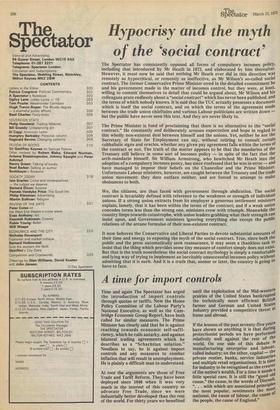A time for import controls
Time and again The Spectator has urged the introduction of import controls through quotas or tariffs. Now the Home Policy Committee of the Labour Party's National Executive, as well as the Cambridge Economic Group Report, have both called for similar measures. The Prime Minister has clearly said that he is against reaching towards economic self-sufficiency, which he calls autarky, and against bilateral trading agreements which he describes as a "Schachtian solution." Needless to say, he is against import controls and any measures to combat inflation that will result in unemployment. He is plainly a difficult man to understand.
At root the arguments are those of Free Trade and Tariff Reform. They have been deployed since 1846 when it was very much in the interest of this country to advocate Free Trade, since we were industrially better developed than the rest of the world. For thirty years we benefited until the exploitation of the Mid-western prairies of the United States bankrupted the technically more efficient British farmer and German and United States industry provided a competitive threat at home and abroad.
If the lessons of the past seventy-five years have shown us anything it is that during protectionist periods we have performed relatively well against the rest of the world. On one side of this debate Is manufacturing enterprise and labour, called industry; on the other, capital — the private rentier, banks, service industries and multiple retail organisations. It is tinle for industry to be recognised as the creator of the nation's wealth. For a time it needs a little special care. It is still the "good 014? cause," the cause, in the words of Disraeli, . with which are associated princiPles the most popular, sentiments the illoq national, the cause of labour, the cause or the people, the cause of England."


































 Previous page
Previous page